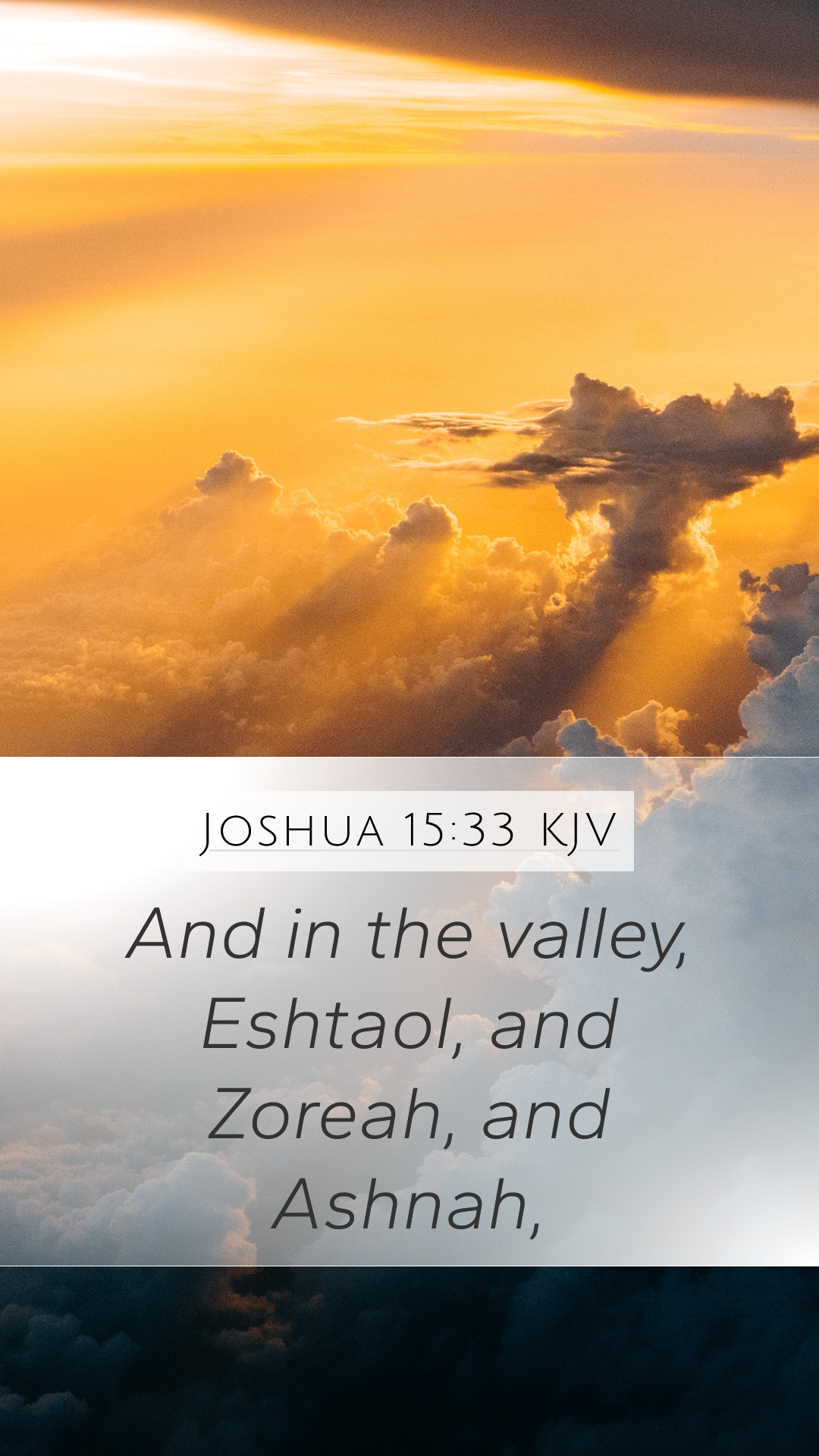Bible Verse Meaning: Joshua 15:33
Verse Reference: Joshua 15:33 - "And in the valley, Elah, and Zoreah, and Ashnah."
Introduction to the Verse
Joshua 15:33 presents a listing of cities within the inheritance of the tribe of Judah. This verse is part of a larger narrative that details the allocation of land among the tribes of Israel, marking significant locations in the history of the Israelites. Understanding this passage involves delving into both its historical context and the spiritual significance of these locations.
Bible Verse Interpretations
The meaning of Joshua 15:33 can be gleaned through the insights provided by several public domain commentaries. Here, we explore interpretations from Matthew Henry, Albert Barnes, and Adam Clarke to understand the implications of this scripture.
-
Matthew Henry's Commentary:
Matthew Henry emphasizes the importance of the cities listed, noting that each city contributed to the heritage and identity of the Judah tribe. He explains that locations such as Elah and Zoreah have historical significance, hinting at their roles in Israel's past conflicts and victories. The mention of these cities serves not only as geographical markers but also as reminders of God's faithfulness to His people in fulfilling His promises.
-
Albert Barnes' Analysis:
Albert Barnes provides insights into the specific locations. Elah is often identified with the famed valley where David battled Goliath. Thus, Barnes points out that these cities were not mere administrative regions; they held stories of faith, warfare, and divine intervention. He posits that understanding these geographical placements can deepen one’s Bible study and offer lessons on courage and reliance on God during trials.
-
Adam Clarke's Exegesis:
Adam Clarke highlights the spiritual implications of this list. He elaborates on how these cities symbolize both past and future hopes for Israel. Clarke discusses the connection between these locations and the overarching narrative of redemption that permeates Scripture, suggesting that they serve as a reminder of God’s unchanging plans for His chosen people. His commentary encourages readers to see beyond the text and embrace the broader theological insights it presents.
Understanding Scripture and Historical Context
To fully grasp the significance of Joshua 15:33, it’s essential to consider the historical context in which these place names appeared. These cities were part of Judah’s territorial inheritance, reflecting God's promise to Abraham and his descendants. The mention of specific locations ties into the covenantal themes prevalent throughout the narratives of both the Old and New Testaments.
Geographical Significance
The towns listed in this verse were strategically located and played pivotal roles in battles and the spiritual life of the Israelite people. For instance, the valley of Elah is historically known for its association with King David and the Philistines, underscoring the conflict between faith and fear in the face of adversity.
Spiritual Insights
Beyond mere history, these cities remind readers of God’s provision and the historical roots of their faith. The allocation of land signified that God is involved in His people's lives through tangible means. This encourages reflection on our own spiritual journeys and the places that shape our faith today.
Application of the Verse
The implications of Joshua 15:33 extend beyond its textual confines. Applying this verse to daily life may involve recognizing the "cities" we attach significance to—our communities, churches, and personal spaces of faith. Engaging in Bible study groups can enhance both our understanding and application of such verses as we share insights and learnings with fellow believers.
Engaging with the Text
For those seeking Bible study resources, this verse challenges believers to dig deeper into the historical narratives of Scripture and understand their relevance to modern faith practice. It encourages individuals and groups to consider how the struggles, victories, and legacies of those who came before us can impact our own spiritual lives.
Cross References
Joshua 15:33 is related to several other passages that provide additional context and understanding:
- 1 Samuel 17 - The story of David and Goliath highlighting the significance of the valley of Elah.
- Joshua 10:12-13 - God's miraculous support during battles, emphasizing His presence with Israel.
- Psalm 78:68-70 - Referring to God's choice of David from among sheep, relating to his beginnings in the same geographical regions.
Conclusion
Joshua 15:33 stands as not just a geographical account but a profound reminder of God’s faithfulness to His people through history. By engaging with public domain commentaries and exploring the historical implications, believers can unlock deeper insights into the meaning of this verse. Whether involved in an online Bible study or personal reflections, understanding Scripture in context strengthens faith and highlights the relevance of biblical teachings today.


